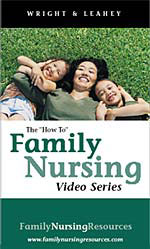 Family nursing experts Drs Wright and Leahey demonstrate clinical skills with actual families. The health problems and health care settings are varied, as are the ethnic and racial groups. Intended for practicing nurses, educators, undergraduate and graduate nursing students, these programs will assist nurses to more effectively involve families in healthcare. Family nursing experts Drs Wright and Leahey demonstrate clinical skills with actual families. The health problems and health care settings are varied, as are the ethnic and racial groups. Intended for practicing nurses, educators, undergraduate and graduate nursing students, these programs will assist nurses to more effectively involve families in healthcare.
Testimonials
“This entire Family Nursing Series of DVD’s is very practical for nursing students and demonstrates clearly what to do and what not to do. I particularly liked the emphasis on family strengths and the importance of good manners in relationships with families. Excellent ideas of questions to ask about the impact of illness on families”. Eileen M. Smit, MSN, FNP-BC, Professor of Nursing, Northern Michigan University
“…my students love to see the theory in action…how to apply the theory. We find these DVDs immensely helpful!” Jane Karpa, BA, RPN CMHW(C/A), MMFT, Assistant Professor, Brandon University-School of Health Studies, Department of Psychiatric Nursing, Winnipeg Campus, Winnipeg, Manitoba, Canada
|
|
#1: How to Do a 15 Minute (or Less) Family Interview (length 23:18)
Featuring real-life clinical scenarios, Wright and Leahey demonstrate key family nursing skills such as how to use manners to engage families in a short period; how to start therapeutic conversations with families; and how to routinely ask key therapeutic questions of families. |
#2: Calgary Family Assessment Model: How to Apply in Clinical Practice (length 26:47)
The co-developers of the model, Drs. Lorraine M. Wright and Maureen Leahey demonstrate the Calgary Family Assessment Model (CFAM) in clinical practice. Highlighting the structural, developmental, and functional categories of CFAM in clinical interviews, they present examples of specific questions the nurse can ask the family, illustrate the helpfulness of the genogram and ecomap, and demonstrate how to construct circular interactional diagrams in clinical settings. |
|
#3: Family Nursing Interviewing Skills: How to Engage, Assess, Intervene, and Terminate with Families (length 22:32)
Observe the four stages of a family nursing interview from engagement through termination. Wright and Leahey define and demonstrate key perceptual, conceptual, and executive skills; show how to apply these skills in family nursing clinical practice; offer sample questions for nurses to explore family concerns/solutions; and show key interventions to help families change. |
#4: How to Intervene with Families with Health Concerns (length 27:54)
Focus on intervention and change! Wright and Leahey demonstrate interventions in three new clinical interviews: encouraging the telling of illness narratives, validating affect, drawing forth family strengths/support, encouraging respite, offering commendations, and offering information/opinions. These interventions focus on strengthening, promoting and/or sustaining effective family functioning in cognitive, emotional, and behavioral domains. |
|
#5: How to Use Questions in Family Interviewing (length 26:45
min)
Increase your interviewing skills by using questions that are effective and time-efficient! Wright and Leahey demonstrate how to use questions that engage all family members and focus the meeting, assess the impact of the illness/problem on the family, elicit family coping strategies/strengths, intervene and invite change, and request family feedback. |
#6: Common Errors in Family Interviewing: How to Avoid & Correct (length 20:14)
How to avoid and correct errors in family interviewing is essential for relational practice and for healing to occur. Interviewing skills are demonstrated in new actual clinical vignettes. Specifically shown is how to create a context for change and work collaboratively with all family members in the room without taking sides. Both physical and mental health issues are explored. |
|
#7: How to Interview Families of the Elderly: Tips and Microskills (length 24:24)
An interview with a clinician and two senior children at the time of their mother’s transition to a care facility demonstrates the microskills to assist families of the elderly with a potentially difficult life transition. Tips for how to quickly engage with family members, obtain a brief relevant history and discuss caregiver impact and burden are provided. Interviewing skills for how to collaborate with senior children and respond to suggestions about their mother’s care are also demonstrated in new clinical vignettes. |
#8: How to Interview an Individual to Gain a Family Perspective: A Clinical Demonstration (length 28:39)
A brief clinical interview honors the notion that illness is a family affair and demonstrates skills for how to assess the impact of chronic illness on one’s life and relationships (work, family, marriage, and children). Interventions of commendations and rituals are also illustrated. |
Purchase Information
Developed and Demonstrated by:
Lorraine M. Wright, RN, PhD and Maureen Leahey, RN, PhD
Produced by: FamilyNursingResources.com |
|
 Family nursing experts Drs Wright and Leahey demonstrate clinical skills with actual families. The health problems and health care settings are varied, as are the ethnic and racial groups. Intended for practicing nurses, educators, undergraduate and graduate nursing students, these programs will assist nurses to more effectively involve families in healthcare.
Family nursing experts Drs Wright and Leahey demonstrate clinical skills with actual families. The health problems and health care settings are varied, as are the ethnic and racial groups. Intended for practicing nurses, educators, undergraduate and graduate nursing students, these programs will assist nurses to more effectively involve families in healthcare.